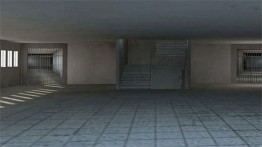Exhibition Lecture | Annabel Wharton: Models as Ethical Agents
Monday, October 10, 2022, 6:30 - 8:30pm

Image: Saydnaya Prison Model, Eyal Weizman, Forensic Architecture and Amnesty International, 2017-continuing
This lecture will be conducted in-person in The Great Hall and through Zoom.
For Zoom attendance, please register in advance here.
For In-Person attendance, please register in advance here.
The claim argued in this lecture is that a model is an agent, like a chemical agent, that has effects on proximate things in the world. Because those effects can be good or bad, a model’s ethical behavior, like that of a human, should always be subject to judgment. The case is made on the basis of an investigation of model prisons.
A discussion following the lecture will be moderated by Sylvia Lavin. This event is presented in conjunction with the exhibition Model Behavior.
Annabel Jane Wharton, William B. Hamilton Professor of Art History, Duke University, received her Ph.D. at the Courtauld Institute, London University. She has also taught as the Harry Porter Visiting Professor of Architectural History at the School of Architecture of the University of Virginia and as a Vincent Scully Visiting Professor of Architectural History at the Yale University School of Architecture. She has received fellowships from such institutions as Dumbarton Oaks, the ACLS, The Center for Advanced Study of the Visual Arts at the National Gallery in Washington, D.C., and the National Humanities Center. Initially her research focused on Late Ancient and Byzantine art and culture. Works from her early career include Art of Empire (Penn State), Tokali Kilise (Dumbarton Oaks/Harvard); Refiguring the Post-Classical City (Cambridge). With Building the Cold War: Hilton International Hotels and Modern Architecture (Chicago), she began to investigate the effects of modernity on ancient landscapes. She combined her pre-Modern and Modern interests in Selling Jerusalem: Relics, Replicas, Theme Parks (Chicago) and Architectural Agents: The Delusional, Abusive, Addictive Lives of Buildings (Minnesota). She continues to investigate the agency of things in her recent book, Models and World Making (Virginia), and in her new project, tentatively titled Post-Mortem Architects: How Cadavers Make Space.
Sylvia Lavin is a critic, curator, historian and theorist whose work explores the limits of architecture across a wide spectrum of historical periods. She is Professor of Architecture at Princeton University and was Chairperson of the Department of Architecture and Urban Design at UCLA. Her books and catalogs include Architecture Itself and Other Postmodernization Effects, Kissing Architecture, and Everything Loose Will Land: 1970s Art and Architecture in Los Angeles. She received her Ph.D. from the Department of Art and Archaeology at Columbia University, and has received numerous awards and grants including from the Getty Research Institute, the Graham Foundation, the AIA and the American Academy of Arts and Letters. She is currently working on a book about trees.
This event is free and open to the public. Registration is required.
View the full Fall 2022 Lectures and Events List.
Please refer to our building access COVID-19 policy below:
Any guests to compus are required to show proof of a vaccine to enter a Cooper Union Building and the Residence Hall.
Stay safe and keep a 6-foot distance. We ask that you maintain a 6-foot distance from all members outside of your party while on campus.
Please reschedule if not feeling well. If any members of your party are not feeling well, please stay home and reschedule your visit.
Located in The Great Hall, in the Foundation Building, 7 East 7th Street, between Third and Fourth Avenues




